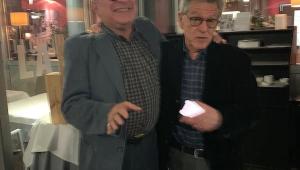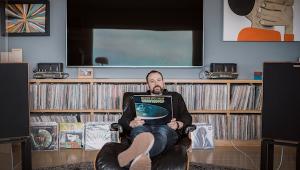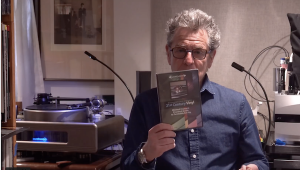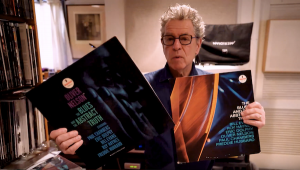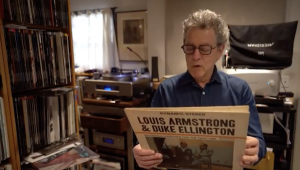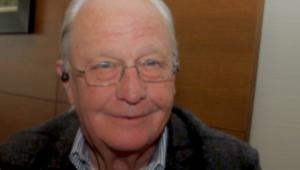A 1998 Interview With Sir George Martin Part 1
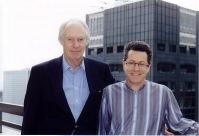
This interview with George Martin was conducted in July of1998 and was originally intended for The Tracking Angle. Unfortunately, we ceased publication before it could be run. It appeared later in Art Dudley’s wonderful Listener magazine, also sadly defunct. Martin was in New York on a media tour publicizing In My Life his farewell production. It wasn’t particularly well received in the press, but it was what Martin wished to do, and that was good enough for him and for me. Meeting Martin was a memorable experience that I shall never forget.
The hotel door cracks open and you're startled to see Sir George Martin has answered your knock, looking just as you've seen him in the photographs, only taller and even more imposing. He welcomes you sincerely, in a polished voice that's soothing yet terribly aristocratic and proper sounding.
Foolishly, involuntarily, (and you hope surreptitiously) your eyes momentarily lose contact with Martin's to dart around the room looking for those other familiar faces always in the photos. You lock onto Martin's eyes, which say to you, "Don't worry. We're used to it. You're not the only one who's looked."
Of course there is no celebrity entourage this visit. It's July of 1998, and Martin is traveling with his son Giles, who co-produced In My Life, an album which the veteran producer says will be his last before retiring. It's a curious, eclectic set featuring Beatles tunes--but no Beatles performances. Instead, there's Robin Williams and Bobby McFerrin doing "Come Together." And a lounge lizard-y Goldie Hawn purring "A Hard Day's Night." And what to make of Silly Putty-faced Jim Carrey's cover of "I Am the Walrus," or the set's finale, "In My Life," recited by Sean Connery?
Beatles songs sung by comedians? Makes complete sense if you remember that, when the classically trained pianist was assigned to produce the four lads from Liverpool, he was heading up Parlophone, an obscure, semi-dormant EMI label which had had some success issuing comedy albums. Martin had worked with Peter Ustinov, Peter Cooke and Dudley Moore, and other British comics, and the label had reissued a series of BBC broadcast Goon Shows, starring Peter Sellers--who at Martin's behest later recorded "A Hard Day's Night" in his best Sir Laurence Olivier voice.
In My Life was not particularly well received when it was issued, nor has time been any kinder. Not that Martin probably cares. He set out to have fun, and by his own account he did, working with friends like Phil Collins ("Golden Slumbers/Carry that Weight"), Jeff Beck ("A Day in the Life") and classical guitarist John Williams ("Here Comes the Sun,") as well as with total strangers like Hawn, Carrey, and Williams, whom he'd admired over the years but never met before these sessions. Also included are newly recorded excerpts from Martin's "Pepperland Suite" from Yellow Submarine, and "Friends and Lovers," a link to the melancholic "In My Life" and which Martin composed shortly after John Lennon's death.
I sat down with Martin that summer morning to talk about his final production--and, of course, about his work with The Beatles, which changed both his life and ours. He was as charming--and seemed as interested in my questions--as could be hoped from anyone who's probably answered every question on the subject imaginable, and then some.
MF: I want to talk about this record that you’ve done. Because when I was approached to listen to it and talk to you about it, and I heard the cast of characters, I was flabbergasted! So before we get to who--
Martin: Flabbergasted?
MF: I mean, I was amazed: Where do these people come from?
Martin: [laughs] That’s a good start!
MF: And I was also skeptical: You know, some of these people I don't particularly associate with music...
Martin: I like shocking people.
MF: Well, you certainly did! So let’s deal with first with the 200-pound gorilla: the three guys who aren’t on the record. Was that a conscious decision?
Martin: [pause] Oh! No, no, no! Theyshouldn’t be on the record. It’s not a Beatles record. It’s my record. Anyway, if they were on the record, they’d be making a Beatles record, wouldn't they? And we’ve done that. You’d have Paul singing “Golden Slumbers”...well, you can find that on Abbey Road!
MF: So that was your choice? What did they think when they found out you were doing this?
Martin: Oh, they knew I was doing this: I told them well in advance. And they were happy about it. I was actually with Paul, working at Abbey Road, when Jeff Beck popped by, and Jeff and I talked about getting on the record. Jeff was very enthusiastic, and Paul was with me when Jeff said, “Can I choose the song?” I said, “Yeah, sure you can.” And he chose "A Day in the Life." They all knew about it, so there was no problem there. Ringo came to our launch party—which was terribly sweet.
MF: So this is your retirement party, this record? This is like your gold watch to yourself?
Martin: [laughs] Kind of. I thought, well, if I’m going to make a last record, it might as well be fun. I don’t see any reason not to enjoy yourself.
MF: Let’s say just for a second that those three guys got together and decided to make one last retirement record for themselves: Could you be coaxed out of retirement to produce that?
Martin: I’m not going to make any more records, if that’s what you mean.
MF: That’s it? Even if they come and ask you, and say, "Hey--you know, this is so great, we want to do the same thing..."
Martin: No.
MF: Okay. Just wanted to get that out of the way. So let’s talk about the artists that you did choose. Some are obvious; I mean, Jeff Beck you worked with. You were in the studio with him. You produced a record of his, so that makes sense. But where did Goldie Hawn and Jim Carrey come from? They did do a great job, which surprised me, but where did you get those choices from?
Martin: Well, if you take Goldie first…I’ve always admired her. She’s one of my heroes. I remember her from the Rowan and Martin days, and I knew she could sing because of that. And that’s a long time ago, that’s thirty years...
MF: I know, but it doesn’t seem that long ago. [Both laugh]
Martin: She was in her twenties--I think she’s 51 now. I thought she was terrific then, and I’ve always thought she was terrific. And I thought, well, she could do something on the record. Dare I ask her?
MF: Had you met her?
Martin: No. I was like a fan. It was like saying, "I’d like to meet you. Do you think you’d do it?"
MF: So what was her reaction?
Martin: Well, first of all, I faxed her actually: “I have this crazy idea about making an album of friends and heroes—and you’re one of my heroes.”
MF: So how’d you get her fax number? You just called an agent…
Martin: It was the easiest thing in the world. [laughs]
MF: [laughs] Well, for you it is; I’m sure it would be hard for me.
Martin: I got a quick call back, saying, "Give me a ring." And I rang her. And she said, “You’re crazy, aren’t you? Well, we ought to meet.”
I was over in Los Angeles doing a television series which hasn’t come out yet, called The Rhythm of Life, which is a series of three one-hour programs—a series of programs about music--and I was over there talking to various people. And I said, "Well, look, I’m here. I could probably see you if you like." So we arranged to meet in Santa Monica. She cycled down from her home in Pacific Palisades, about seven miles away. And we met for breakfast. She turns up in a Lycra suit, with racing helmet and shades and racing bike, which she propped by the side of the restaurant. She took off her helmet and shook out her hair and walked in. I said, “Did you just cycle in on that thing? Through the streets?" She said, "Yeah." I said, "Don’t you get recognized?” She said, “Nobody knows me.” It was very sweet.
And we had a great time, having breakfast together. She said, “How do you know I can sing?” I said, “I remember. I’ve heard you singing. I’m sure you can do this.” So she said, “What do you want me to sing?” I said, “Well, I had an idea of you doing 'A Hard Day’s Night.'" She looked at me and said, “Now I know you’re crazy!” [Both laugh] Because she imagined, you know--John Lennon. And I said, “No, think of it differently. Think of it as a kind of cabaret act. Think of it like a jazz item. You know, put in your little inflections of Peggy Lee. Or think of Marilyn Monroe singing to the President. Or think of yourself. Put your own style to it.” She said, “Yeah, maybe it could work. How do we go about it?” I said, “Well, we find a key that suits your voice. I do a score. And you do it.”
So we went back to her house right there and then. I played around on the piano, and she sang for a bit. We picked a key and I said, “Fine. We’ll do it.” Then she said she wanted to come to England--which was lovely--just what I wanted, for her to come and work in our studio. And all was set. Then about ten days beforehand, she rang up and said, "George, I’m terribly sorry, but I can’t make it." And I thought, am I losing her? And I said, "Why?" "Well, I’ve really got an offer I can’t refuse: I’ve been given the offer of directing a picture and I want to do this." And I said, “Well, of course, you must.” She said, “Can you wait 'till I finish the picture?” I said, “How long?” “Six months!” “Sorry, Goldie. I can’t...”
I said, “When do you start? Can we do it before you start?” She said, “Next week I’m going to find locations with the producer.” I said, “Well, where are you going to be?” She said, “For the next two or three weeks I’ll be around the Houston area in Texas.” Well, I was coming again to America to do some more of this filming, so I said, “Look, if I come over, would you give me an afternoon or an evening?” She said, “Of course I will--but can we do that?” I said, “Sure we can!” So I got Giles to book her a studio in Austin, Texas—a crummy little place. And we booked a three-piece jazz combo that I’d heard about, took her into the studio, and worked with her. She was terrific! She was just so easy.
MF: That sounds good. That recording sounds good.
Martin: And that was it. And then I took that simple recording back to London, jacked it up, and ran a new accompaniment under her voice.
MF: Totally new, or you added to it?
Martin: I took away some of the stuff we had in there...and it worked very well.
MF: Her intonation is incredibly good, and everything about the way she sang was just rock solid. I was amazed.
Martin: I thought she had a very good feel for things. We really enjoyed it, and we did it so quickly. We all went and had a great dinner afterwards.
MF: It’s better that way sometimes, isn’t it? You just do it, throw it away, and it’s there...
Martin: This kind of sums up the record, because I did have fun and so did she. And fun’s what it’s all about—just having a ball.
MF: And it was fun to listen to also. And it wasn’t kitschy: It really worked.
What about Jim Carrey? You’d heard Goldie Hawn sing, so you knew she could...but Jim Carrey?
Martin: Well, the song came first. I really wanted to have "I am the Walrus" on this album because it’s such a personal one for me: I worked very closely with John on the original and did the original score, and surprised him with it. And it’s such a crazy, zany song. And I wanted to have that again. So I had to find someone to do it.
It’s a difficult song. The lyrics are quite hard to get your tongue around. You’ve got to sing it with a good sense of rhythm and with a good sense of acting, too. And you’ve got to have a voice. And you’ve got to be a little bit crazy to try it. So if you think of all those ingredients and you focus on who could possibly do it...Jim Carrey sprang to mind. Now, I hadn’t met him, and I rang him and spoke to him about it...
MF: ...I think it’s a great thing you can call these guys up. Nice when you have that kind of status. [George laughs] Think I can call 'em up? I don’t think so.
Martin: [laughs] Well, having been around for such a long time…
MF: So what was his reaction to that?
Martin: He loved it. I then discovered he was a Beatles fan.
MF: He did it amazingly. He took it and did certain things in the vocalizing that were different and surprising--
Martin: Which was the idea. He was very enthusiastic about it. I was with him this week actually, because we had just come in from Los Angeles. Giles and I and he had dinner together on Tuesday night. And we were chatting about things, and he said to me, “You know, that was one of the best things I’ve ever done.” He didn’t mean in terms of achievement. He meant in enjoying it. He came over to London and we did it all there. And we really had great fun—a great time.
MF: How many takes did it take?
Martin: Very few. Actually, he brought a whole host of friends, about ten of them, who sat in the back of the control room while he...vocalized. Of course, he’s such an extrovert. We were filming it too. There’s an hour’s film, a documentary of the making of this record, which comes out very well.
MF: That must be fun.
Martin: After awhile I had to stop the cameras because Jim was playing so much to the cameras: He’s such a consummate actor. But he entirely enjoyed it, and so did we.
MF: Now what was that business at the end, where he talks about despoiling a great work of art...?
Martin: Yeah, well...that’s his spoofing.
MF: Was he talking about the song he was doing?
Martin: Sure!
MF: Now: Robin Williams. Everybody knows Robin Williams. His pitch was pretty off on that opening song. Did you think about correcting him or did you just let it go?
Martin: I thought...no. I mean, you can correct people. It’s quite easy to do. But on the other hand, I think that what I heard then was okay. I know it’s not the truest sound we’ve ever heard, but it was Robin, and I believe in getting the character of the people.
...And obviously the opening is Bobby McFerrin. Robin and Bobby were sort of crooking each other up. They’ve worked a lot together in the past.
MF: On stage?
Martin: When Robin was in The Comedy Store, Bobby used to open for him. So they’ve been friends for a long time. And of course they’re such extraordinarily different characters: Bobby McFerrin is a very fine musician; you know, he spends his time conducting orchestras! And he can imitate almost any instrument you can imagine. Ask him to sing a cello line, he’ll sing it, and it’ll be a cello singing. And I thought it would be a good idea to start the record like that.
MF: Were there any artists you wanted to work with who wouldn’t get involved?
Martin: I asked one person who didn’t want to do it, and I can’t tell you his name.
MF: I understand.
Martin: That was the only turndown I had. I asked someone else who tried and failed. But with everyone we worked with, we agreed that if there was any failure, we wouldn’t talk about it.
MF: That’s fair enough. Did anybody try to climb on board after they heard that you were doing it that you had to turn down?
Martin: Sure! And I had to turn people down.
MF: And you won’t talk about that either.
Martin: Nope. [laughs]
MF: Have you heard William Shatner’s version of "Lucy in the Sky with Diamonds"?
Martin: I’ve heard a lot about good old William Shatner, and yes I know all about it. I haven't actually heard it, but I guess it’s pretty funny...
MF: You should hear it! There’s a whole album of that, of celebrities doing Beatles songs.
Martin: It’s dangerous territory.
MF: Oh, sure: Everyone wanted to hop on board at a point in time in the ‘60s...
What were the other considerations that you had for a final project? Were you mulling other ideas...?
Martin: Once I decided I wasn’t going to make any more records and to make a final one, my first thought was to write a complete album of new material.
MF: A symphonic work?
Martin: I had written music all my life and on this album, there were a couple of things I’ve done. But then I thought: Who the hell’s going to want to listen to that, really? It would be very self-indulgent. I can do that in my own back yard and keep it to myself—which I probably will. So why inflict that on other people?
I thought, well, if I’m going to make a record, why not do something that I’m going to have fun doing? Why not have something that other people are going to have fun doing? And maybe people generally will get that sense of fun and enjoy it. That was it. It was purely...a fairly innocent attempt.
MF: Then you sat down and made up a list of people and the songs…
Martin: Yeah, and it was fun doing that, actually. You can play that game if you like: What’s your favorite song? Who would I like to get to sing it? When you have the choice of the world, it’s very difficult actually to pick out something you’d really want. That one? The choices are quite surprising. When Jeff Beck said he would like to choose that title, when he said he’d like to do "A Day in the Life," I was astonished. If I had to choose one song I would have expected him to do, that would have been the bottom of the list—I would have never…!
So it’s quite surprising how people do pick them. People’s ideas are so varied. Which is why we’re such human beings, I guess.
End of Part 1




